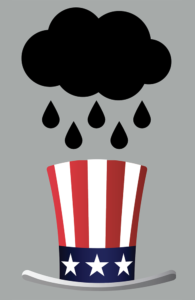America: The Farewell Tour

BY CHRIS HEDGES
SIMON & SCHUSTER, 2018
400 PP.; $27.00
For better or worse, you know what you’re going to get with a Chris Hedges’s book. Despite some of them having ostensible focuses—Death of the Liberal Class being about the silence and complicity of liberal intellectuals when it comes to money-power; American Fascists being about the fear and hatred promoted by the religious right’s propaganda network of schools, megachurches, self-improvement seminars, and TV channels—they’re really all about the same thing: the self-destruction of our country. How neighbor is turned against neighbor. How the rich horde more and more wealth and hide behind more and more elaborate security. How great effort is put into making us dumb and distracted—and how we’re often guilty of aiding in our own degradation.
America: The Farewell Tour (Hedges’s latest book) is no different. It’s another civilization-is-going-to-hell shelf-stuffer. A dozen of which seem to get published every week nowadays. The difference between Hedges and these other authors, however, is that with Hedges you get the impression he really believes things are getting irreversibly bad and, more importantly, that he really gives a damn about it.
America is divided into seven chapters: “Decay,” “Heroin,” “Work,” Sadism,” “Hate,” “Gambling,” and “Freedom.” Each chapter has little to do with any other. They stand alone and are tied together by nothing but the author’s stylistic directness and general sense of doom. “Heroin,” for example, is mostly about two women from New Jersey who were both addicted to the painkiller. One of them, after years of being prostituted by her husband to pay for drugs, has gotten clean and now lives a relatively normal life. The other died of an overdose. Conversely, “Sadism” begins with Hedges attending a six-hour course titled “Creative Mindfuckery & Authentic Interrogation for BDSM Intensive” that’s mostly about prostitution, pornography, and sexual humiliation.
 The other five chapters are on the alt-right (“Hate”), outsourcing (“Work”), casinos (“Gambling”), slave prison labor (“Freedom”), and oligarchy (“Decay”). Although they aren’t actually that internally coherent. In truth, most of America is recycled material from Hedges’s weekly Truthdig columns, and not all of that recycled material mends well together. Not only in a thematic sense—on one page of “Work” we’re talking about the Carrier jobs Trump promised he’d save from going to Mexico, on the next we’re being given a brief history of the resilience and persecution of Eugene Debs—but in a moral sense either.
The other five chapters are on the alt-right (“Hate”), outsourcing (“Work”), casinos (“Gambling”), slave prison labor (“Freedom”), and oligarchy (“Decay”). Although they aren’t actually that internally coherent. In truth, most of America is recycled material from Hedges’s weekly Truthdig columns, and not all of that recycled material mends well together. Not only in a thematic sense—on one page of “Work” we’re talking about the Carrier jobs Trump promised he’d save from going to Mexico, on the next we’re being given a brief history of the resilience and persecution of Eugene Debs—but in a moral sense either.
For example, on the alt-right, Hedges is pretty clear about his feelings on meeting their violence with violence: we shouldn’t do it. And most of his reasons why we shouldn’t are completely sensible: it gives the state more excuses for surveillance and oppression, it plays into the fascists’ trick of initiating street violence then promising to restore peaceful order if they’re given power, and it takes away from time that should be spent organizing for positive programs. All well and true. However, Hedges’s criticism of anti-fascism oscillates between tactical scrutiny and moral denunciation. He writes, “the violent left revels in the hypermasculinity that enthralls the alt-right” and violence “reduces us to the moral level of the oppressors” but also says, “there is no moral equivalency between antifa and the alt-right.” But what about the moral leveling of violence? He also approvingly quotes Italian writer Ennio Flaiano’s famous epigram, “There are two kinds of fascists: fascists and anti-fascists.” So does he or doesn’t he think there’s a moral equivalency between the two?
The author’s actual opinion on this doesn’t matter. Or at least it isn’t the point. The point is that because America is composed of new and recycled material—recycled material that was written over a five-year span and was intended to address specific circumstances—the book’s perspective on things can fluctuate in striking ways. Especially on things that merit precise thinking.
In America, Hedges attacks the rise of cruelty, addiction, and militarism and gets right their fundamental source; it goes by many names: “capitalism,” “special interests,” “cronyism,” “the profit motive.” Some of these names insinuate that the problem lies in human psychology or incentive structures, but where it actually lies is in power dynamics: by who gets to make the decisions. In economic governance—investment, profit distribution, institutional planning—decisions are made by the executive-investor class with pretty much no say from employees. If you fix that, you don’t fix everything, but you do fix quite a lot.
Hedges, however, while recognizing the problem doesn’t seem motivated to fix it. In fact, in a book full of social passion, not “taking power” is one of the things he seems most passionate about. Toward the end of America he gives a list of policies he would like to see implemented. Almost all of them are good and would make life better for the average American, but what they’re about is changing who benefits rather than who decides. And that isn’t an error of omission. Hedges doesn’t think it’s “our job to take power.” Why? “Because “power is poison. It doesn’t matter who wields it.” Therefore, rather than having power, “it is our job to build movements to keep power in check.”
Like the on-again, off-again moral equivalency between fascists and anti-fascists, Hedges’s anti-power position isn’t always clear. For instance, who is the “we” he’s referring to? Everyone without power? Radical intellectuals like himself? The Left in general? And what does he mean by “taking power”? Revolution? Electoral success? Workplace democracy?
Nonetheless, regardless of precise meaning, it’s ridiculous to tell people not to take power because it will corrupt their souls. As is well documented in America, not having power corrupts your soul just as much. The powerless people Hedges interviews—the sexually abused, the hate-filled, the addicted, the jobless—aren’t any morally or spiritually better off. The biblical ethic of “what good is to gain the world and lose your soul” is a way of eschewing progress. Moralists like to think it puts a check on the ambitions of the rich, but more often than not it’s just used to keep the poor in their place.
America is an intense and distressing read because the United States is an intense and distressing place. Or feels that way for too many people. In 2017 over one million Americans attempted suicide (474,173 succeeded). Drug overdoses are now a leading cause of death (72,000 last year and climbing). Survivalists prepare for the end of the world with a mixture of sadistic glee and cataclysmic relief. Hedges sounds like a fire-and-brimstone preacher when talking about these social diseases but a pie-in-the-sky theologian when he talks about overcoming them. He desires a realm of moral purity that shuns power, but in the end that’s defeatism masquerading as piety. Reading America is like flipping through one of those old viewmasters. But instead of blurry pictures of the London Tower there are vivid images of human degradation. Hedges is right for what he wants us to see but wrong in the limits he puts on what we should do about it.
